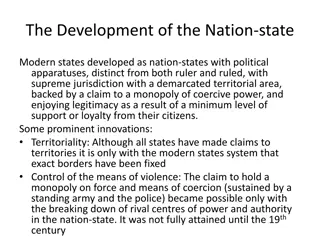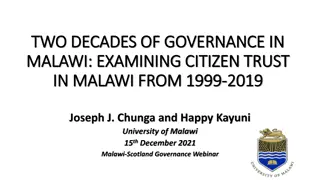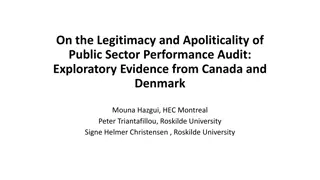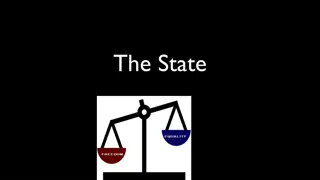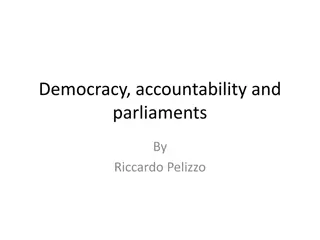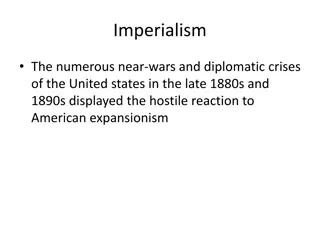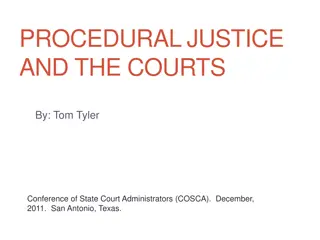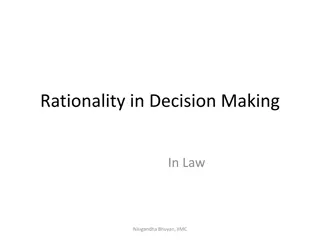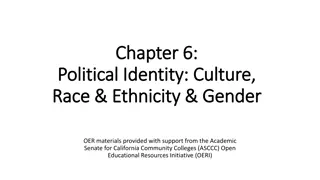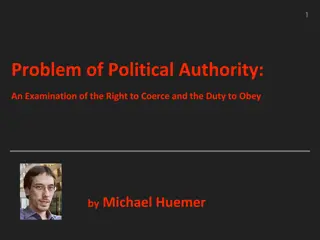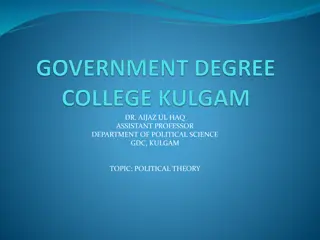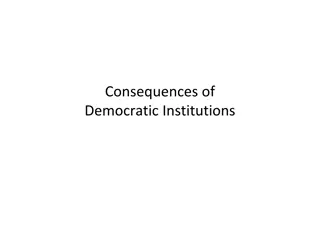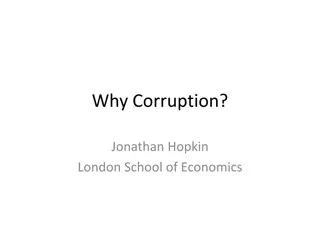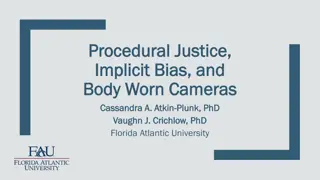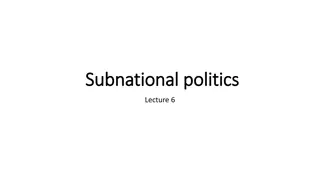Unrest and Uncertainty: Post-Election Turmoil in Pakistan
The recent national elections in Pakistan have sparked controversy and unrest, with former prime ministers Imran Khan and Nawaz Sharif both claiming victory amidst allegations of voter fraud and political restrictions. The country faces economic challenges, internal insurgencies, and strained intern
8 views • 5 slides
Understanding Power and Authority: Exploring Legitimacy Through Works of Lukes and Weber
Diving into the concepts of power and authority, this discussion focuses on the crucial role of legitimacy in distinguishing between the two. Drawing insights from the works of Lukes and Weber, the discourse delves into the dimensions of decision-making, non-decision-making, and shaping desires to i
0 views • 28 slides
Evolution of the Nation-State and Modern State Concepts
The development of the nation-state marks a significant shift in political organization, characterized by centralized power, territoriality, and legitimacy gained through citizen support. Key innovations include territorial demarcation, monopolization of coercion, impersonal power structures, and th
0 views • 8 slides
Interdisciplinary Approach in Political Science and Its Relation with History
The need for an interdisciplinary approach in political science emerged in the 20th century to study political issues from various social science perspectives. This approach emphasizes the interrelation between political science and other disciplines like history. History provides the foundation for
0 views • 23 slides
Institutionalism and Methodological Issues in Political Science
Institutionalism is a foundational concept in political science, emphasizing the study of governing institutions and their role in shaping political behavior. It explores inductive and deductive approaches to research, highlighting the significance of empirical evidence and theoretical assumptions.
0 views • 19 slides
Understanding Gramsci's Political Theory and its Relevance Today
Gramsci's political theory, focusing on concepts such as hegemony, historical bloc, and the role of intellectuals, offers valuable insights into contemporary political challenges. Explored through the lenses of Prof. Ken Spours and Stuart Hall's analytical tradition, this analysis sheds light on Con
0 views • 13 slides
Key Terms in Ch. 21: Reaction, Revolution, and Romanticism, 1815-1850
The key terms discussed in Chapter 21 include principle of legitimacy, balance of power, ideology, conservatism, principle of intervention, ultraroyalists, ministerial responsibility, and liberalism. These terms highlight important political philosophies and concepts during the post-Napoleonic era a
0 views • 17 slides
Understanding Legitimacy in Family Law
Legitimacy in family law refers to the status acquired by a person born in lawful wedlock, as opposed to illegitimacy where a child is born out of wedlock. Legitimation is the process through which an illegitimate child gains legitimate status. In Nigeria, customary law also recognizes legitimacy ba
0 views • 22 slides
Evolution of Citizenship in Liberal Democracy
Citizenship within liberal democracy entails equal rights, duties, liberties, and constraints for individuals within a political community. The entrenchment of civil and political rights has shaped the struggle for membership and participation in political communities. Civil rights, essential for in
1 views • 11 slides
Examining Citizen Trust in Malawian Governance Over Two Decades (1999-2019)
This paper critically analyzes public trust in key government institutions in Malawi from 1999 to 2019, highlighting a general decline in trust levels and its impact on political legitimacy. The study explores factors influencing public trust, such as perceptions of government performance, integrity
0 views • 12 slides
Understanding Political Theory through a Contextual Approach
Exploring G.H. Sabine's perspective on political theory through a contextual approach, emphasizing the importance of historical context and societal influences. Sabine argues that while political theory evolves with its contemporary politics, it should be analyzed within its specific time and social
0 views • 9 slides
Understanding Public Sector Performance Audit in Canada and Denmark
The study explores the legitimacy and apoliticality of Performance Auditing (PA) in Canada and Denmark, focusing on how Supreme Audit Institutions (SAIs) maintain political neutrality and legitimacy. Existing knowledge points to the inherent political nature of PA and the challenges SAIs face in pre
4 views • 9 slides
Understanding Political Beliefs and Behaviors: A Comprehensive Overview
Explore the formation, evolution, and transmission of political beliefs, as well as the impact of differing beliefs and behaviors on the political process. Delve into platform issues, political affiliations, and their influences to gain a deeper understanding of the political landscape.
1 views • 53 slides
Understanding Nationalism in Political Science
Nationalism, a complex concept, defines the nation as the fundamental unit of political rule. It encompasses a mix of objective and subjective factors, including cultural, ethnic, and political traits. The definition of a nation is subjective, based on how its members perceive themselves as a distin
0 views • 27 slides
Illegitimate Debts and the Asian Development Bank: The Philippine Case Overview
The Philippine government's debt situation is outlined, highlighting the importance of a historical audit to determine the legitimacy of foreign loans. The General Appropriations Act of 2017 calls for a debt audit on specific projects. The audit aims to ascertain the legitimacy of contracted loans a
0 views • 15 slides
Understanding Political Science: A Comprehensive Overview
The study of political science delves into various aspects, from the pursuit of the good society to the exercise of power and the allocation of resources. It encompasses specialized fields such as American politics, international relations, comparative politics, public policy, and political philosop
0 views • 5 slides
Language Ideologies in Dialect Contact Situations
The study explores how language ideologies influence the legitimacy and status of different dialect varieties in contact situations. It delves into the construction of power relations, social sameness and difference, and cultural stereotypes through language use. Key concepts such as language ideolo
0 views • 28 slides
Exploring Political Philosophy and the State's Authority
Delve into thought-provoking questions on political philosophy, legitimacy of authority, roles of the state, and individual obligations. Reflect on the state's power to enforce laws and restrictions, contrasting it with individual actions. Consider the complexities of governance, revolution justific
0 views • 9 slides
The Red Brigades: Strategy, Tactics, and Targets
The Red Brigades operated with the strategy of establishing a dictatorship of the proletariat through armed propaganda and violent actions to overthrow the state. Their tactics involved calculated political terrorism and politically motivated kidnappings and murders, avoiding mass casualties. Initia
0 views • 5 slides
Understanding Democracy, Accountability, and the Role of Parliaments
Explore the concepts of democracy, accountability, and the significance of parliaments in ensuring government transparency and citizen participation. Learn how factors like political culture, institutions, and legitimacy impact the durability of democratic systems. Discover the link between democrac
0 views • 24 slides
Political Development Theory and Practice: An Overview
Political development refers to the evolution of institutions forming the political power system of a society. Initially popular in the 60s-70s to describe political change, it later fell out of favor for being Euro-centric but has since regained significance. The concept encompasses aspects like po
0 views • 13 slides
Political Party Funding Act 2018 Overview
The Political Party Funding Act of 2018 in South Africa aims to enhance multi-party democracy by regulating the funding and donations to political parties. It establishes the Multi-Party Democracy Fund funded by private sources, alongside the existing Represented Political Party Fund. The Act prohib
0 views • 17 slides
Understanding Political Party Funding Act of 2018
The Political Party Funding Act of 2018 regulates the funding of political parties in South Africa, ensuring equitable and proportional funding for parties participating in national and provincial legislatures. The Act defines various terms such as donations, foreign persons, and political parties,
0 views • 42 slides
American Imperialism in the Late 19th Century
The late 1880s and 1890s saw the United States embroiled in near-wars and diplomatic crises due to American expansionism. This included the annexation of Hawaii despite Queen Liliuokalani's opposition, and the debate over acquiring the Philippines for economic interests. Anti-imperialists argued aga
0 views • 5 slides
Evolution of Political Ideas and Influences on American Founding
In the history of politics, major ideas like laws of nature, unalienable rights, divine right of kings, social contract theory, and rights of resistance have influenced the American founding. Various traditions such as Judeo-Christian, English common law, Enlightenment, and republicanism played a si
0 views • 68 slides
Understanding Procedural Justice and Public Trust in the Justice System
The discussion delves into the goals of the justice system, the importance of public trust and confidence, and the concept of legitimacy in the context of the courts. Despite improvements in the delivery of justice, trust and confidence among Americans, especially in minority groups, remain a challe
0 views • 39 slides
Rationality in Decision Making: Exploring Law and Philosophy
Explore the concept of rationality in decision making as applied to law and philosophy, examining the role of reason, economics, psychology, and the rule of law. Delve into the conceptions of rationality in law and the importance of applying reason to ensure good governance and political legitimacy.
0 views • 17 slides
Explore the Fascinating World of Political Science
The Department of Political Science offers a range of courses, delving into topics such as political theory, international relations, and governance. Understand the distinction between politicians and political scientists, and explore branches of political science like public administration and huma
0 views • 16 slides
Understanding Political Identity: Culture, Race & Gender in Society
Explore the intricate aspects of political identity, culture, race, ethnicity, and gender in society. Discover how individuals shape their identities and the impact of political mobilization on society. Uncover the significance of political socialization and the role of societal institutions in shap
0 views • 20 slides
Exploring Legitimacy and Public-Private Partnerships in Cybercrime Enforcement
Investigate the legitimacy of public-private partnerships in addressing cybercrime, focusing on botnets and related issues. The study examines the classic model of legitimacy involving the state, citizens, and the market, and explores different stakeholders' roles in ensuring legitimacy in enforceme
0 views • 14 slides
Exploring Political Authority: Right to Coerce and Duty to Obey
This presentation delves into the concepts of political authority, legitimacy, and obligation, examining the right to rule and the duty of citizens to obey their government. It contrasts vigilante scenarios to government actions, discusses social contract theories, differentiating explicit and impli
0 views • 21 slides
Evolution of Political Protests in Modern Russia: A Historical Overview
This article provides an in-depth analysis of the evolution of political protests in modern Russia from 1990 to present. It discusses the attitude of Russian journalists towards protests, basic concepts of political protest in modern political science, myths surrounding protests in Russia, and the f
0 views • 24 slides
Impact of Political Stability on Equity Trading Costs of Cross-Listed Firms
The research explores the relationship between political stability and equity trading costs of cross-listed firms, highlighting the impact of political institutions, liquidity, and investor protection. It delves into the importance of factors like quality of political institutions, transparency, and
0 views • 24 slides
Interdisciplinary Relationships in Political Science
Political science and history share a symbiotic relationship, with history providing the foundation for political analysis while political science influences historical events. The contribution of economics to political science is evident in how economic conditions shape political ideologies and pol
0 views • 12 slides
Understanding Political Theory: Definitions, Differences, and Significance
Political theory encompasses systematic explanations of political phenomena, distinct from political thought which involves ideas and opinions of philosophers. It constitutes both political science and philosophy, addressing both empirical and evaluative aspects. The significance lies in finding sol
0 views • 7 slides
Remedial Measures Implemented by Indian Political Party
Explore the impactful remedial measures taken by a prominent political party in India through a collage presentation. Delve into the functions of political parties, understanding partisanship, the necessity of political parties, and more. Gain insights into the significance and role of political par
0 views • 23 slides
Perspectives on Democratic Institutions: Majoritarian vs. Consensus Vision
Democratic institutions have consequential impacts on political representation, economic policy, ethnic conflict, and democratic survival. Two distinct visions, majoritarian and consensus, shape the distribution of power in governance. The majoritarian vision concentrates power in the hands of the m
0 views • 112 slides
Understanding Corruption and Its Implications on Institutions and Society
Corruption, as discussed by Jonathan Hopkin from the London School of Economics, is viewed through various lenses - from a reflection of traditional hierarchical ties in modernization theory to the inadequacy of political institutions. Economists highlight how corruption distorts market allocation.
0 views • 8 slides
Understanding Procedural Justice, Implicit Bias, and Body Worn Cameras
This content covers the concepts of procedural justice, implicit bias, and body-worn cameras in the context of law enforcement. It explores the importance of procedural justice, strategies for enhancing it, and its significance in policing, with a focus on fairness and legitimacy. The images provide
0 views • 38 slides
Centralization vs Decentralization: A Comparative Analysis
This lecture delves into the dynamics of centralization and decentralization in subnational politics, exploring the benefits of each system, differences between federal and unitary government structures, challenges in reconciling territorial differences, reasons for the increasing popularity of cent
0 views • 15 slides


